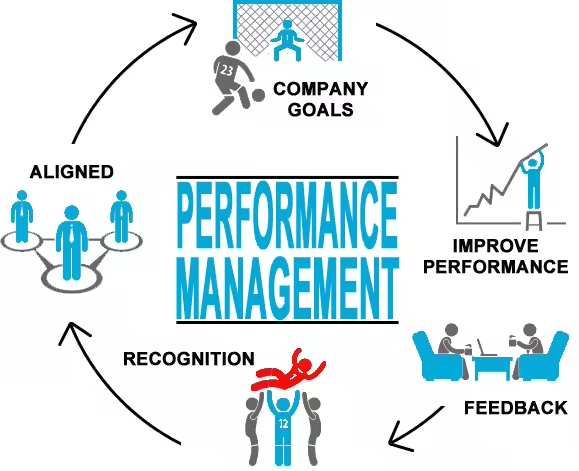Before diving deep into performance management goals, we must clearly understand what performance management is all about. Performance management is the systematic process of setting goals, tracking progress on the same goals and taking corrective measures where performance is below expectations. This process can happen at all levels of the organization; company, business unit, department and individual. Performance management goals vary from organization to organization, although overall goals apply across all organizations. The scope and processes can vary depending on the priorities of the organization.
Performance management goals help to direct the organization in the direction they would want to manage their performance management system. On the basis of these goals an organization can then structure the performance management system to support the business strategy.
The first performance management goal is to assist the organization in setting, tracking and taking corrective action on all performance issues. Whether this goal can be achieved depends on several factors, and chief among them is how the organization uses empirically proven goal-setting and feedback mechanisms processes. For example, when setting goals, make sure the goals are challenging but achievable. This study shows that goal setting has a positive effect on performance. The impact was greater when goals were set at the group level rather than individually. The value of goal setting to employers is massive in terms of output and monetary benefits. The findings mentioned above collaborate with many other studies that show that setting challenging goals leads to better performance.
There is enough research evidence to show that goals provide motivation, redirect effort, foster persistence and allows individuals to use their knowledge to achieve the set goals.
You can start here for those interested in further readings on the impact of goal setting on performance.
The second performance management goal is to give feedback to staff on how they are performing against agreed expectations. There is enough research evidence to show the impact of feedback on employee performance. The feedback on performance needs to be given more frequently, regardless of the level of focus. Some research has shown that feedback-seeking behaviour positively affects job performance. This study went a step further to look at the impact of feedback on performance and confirms the huge impact that feedback has on employee performance. While feedback has been found to improve performance, take note of some studies that have shown a decrease in performance.
The third performance management goal is to align employee effort with the organization's goals. This goal assumes that there will be a proper process for aligning employees' goals with higher-level goals. We know that, in practice, this is not an easy process.
The fourth performance management goal is to reward performance. This insightful study shows that there was a 22% gain in performance due to the implementation of a performance incentive. Performance was much better under a group incentive than an individual-based incentive. Under the same study, monetary incentives had a bigger impact on performance than non-monetary incentives. This study looked at the impact of financial incentives on performance, and the results were positive. The only credible process for implanting a performance-based pay system is through a performance management system.
The fifth performance management goal is to identify training needs. Through performance management and appraisal systems, employers can identify training needs, especially in cases where employees are failing to meet the expectations set by the supervisor. Identifying training needs will allow managers to create development plans to address performance shortcomings.
The sixth performance management goal is to allow the employer to take corrective measures when employees fail to achieve agreed performance targets. There is no better way of identifying performance targets than using a performance management system.
The seventh performance management goal is to operationalize the company's strategy. A company's strategy can be tracked only through a performance management system which allows the employer to take corrective action. A performance management system can be used to breakdown down and cascade strategic goals down the levels of the organization.
The eighth performance management goal is to increase overall business performance. There is a consensus among academics and practitioners that performance appraisal can positively impact a wide range of organizational outcomes. Some notable outcomes include individual employee task performance, productivity, organizational citizenship behavior, job satisfaction, and commitment.
The ninth performance management goal is to ensure that setting goals, tracking, assessing and giving feedback are fair. Empirical research consistently shows that when performance management procedures are perceived as fair, employees react favourably to the outcome of such a process.
Whether a performance management system achieves the intended outcomes depends on other variables. For example, the perceived fairness of the process affects the impact of such systems on performance outcomes.
Related: Results Based Management Vs Performance Management A Case For Zimbabwean NGOs
Conclusion
Performance management goals vary from company to company. Companies use performance management systems to evaluate their employees' work and devise ways to make them more effective.
Companies can benefit from performance management systems by giving their employees clear goals to work toward, measuring their progress toward those goals, and receiving feedback from the company on their performance.
Performance management systems help businesses determine which areas their employees are doing well in and which require additional training or assistance. These systems also assist businesses in determining which areas of their employees require additional training or support.
Some benefits of implementing performance management systems include increased employee engagement, increased productivity, improved communication between managers and employees, and better alignment between individual and organizational goals.
Companies can achieve their goals more effectively with the help of performance management systems, which also aid in identifying areas for improvement.



